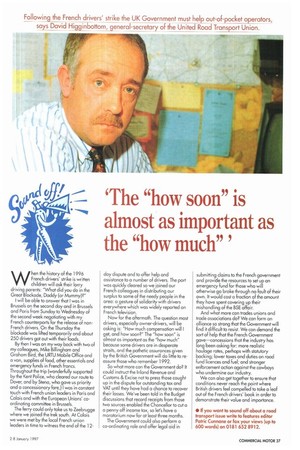'The "how soon" is almost as important as the "how much" '
Page 39

If you've noticed an error in this article please click here to report it so we can fix it.
When the history of the 1996 French drivers' strike is written children will ask their lorry driving parents: "What did you do in the Great Blockade, Daddy (or Mummy)?"
I will be able to answer that I was in Brussels on the second day and in Brussels and Paris from Sunday to Wednesday of the second week negotiating with my French counterparts for the release of nonFrench drivers. On the Thursday the blockade was lifted temporarily and about 250 drivers got out with their loads. By then I was on my way back with two of my colleagues, Mike Billingham and Graham Bird, the URTU Mobile Office and a van, supplies of food, other essentials and emergency funds in French francs. Throughout the trip (wonderfully supported by the Kent Police, who cleared our route to Dover, and by Steno, who gave us priority and a concessionary fare,) I was in constant touch with French union leaders in Paris and Calais and with the European Unions' coordinating committee in Brussels.
The ferry could only take us to Zeebrugge where we joined the trek south. At Calais we were met by the local French union leaders in time to witness the end of the 12 day dispute and to offer help and assistance to a number of drivers. The port was quickly cleared so we joined our French colleagues in distributing our surplus to some of the needy people in the area: a gesture of solidarity with drivers everywhere which was widely reported on French television.
Now for the aftermath. The question most drivers, especially owner-drivers, will be asking is: "How much compensation will I get, and how soon?" The "how soon" is almost as important as the "how much" because some drivers are in desperate straits, and the pathetic assurances given by the British Government will do little to reassure those who remember 1992.
So what more can the Government do? It could instruct the Inland Revenue and Customs & Excise not to press those caught up in the dispute for outstanding tax and VAT until they have had a chance to recover their losses. We've been told in the Budget discussions that record receipts from those two sources enabled the Chancellor to cut a a penny off income tax, so let's have a moratorium now for at least three months.
The Government could also perform a co-ordinating role and offer legal aid in submitting claims to the French government and provide the resources to set up an emergency fund for those who will otherwise go broke through no fault of their own. It would costa fraction of the amount they have spent covering up their mishandling of the BSE affair. And what more can trades unions and trade associations do? We can Form an alliance so strong that the Government will find it difficult to resist. We can demand the sort of help that the French Government gave—concessions that the industry has long been asking for: more realistic haulage rates, perhaps with statutory backing; lower taxes and duties on road fund licences and fuel; and stronger enforcement action against the cowboys who undermine our industry. We can also get together to ensure that conditions never reach the point where British drivers feel compelled to take a leaf out of the French drivers' book in order to demonstrate their value and importance.
















































































